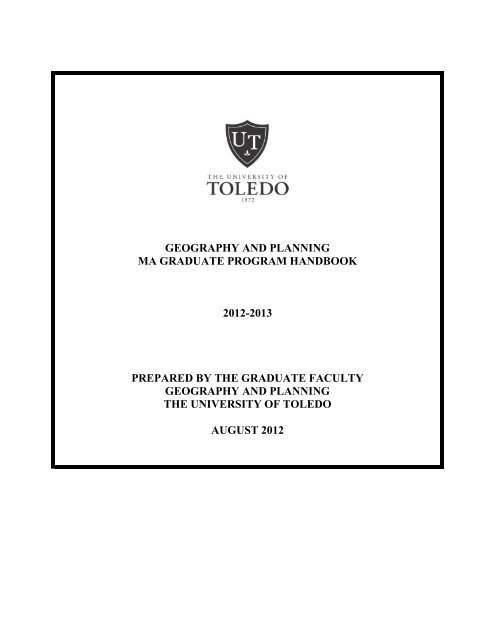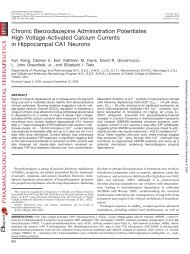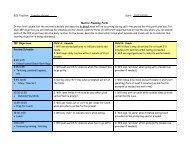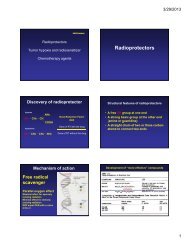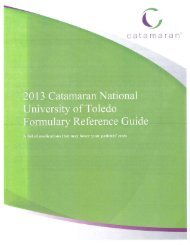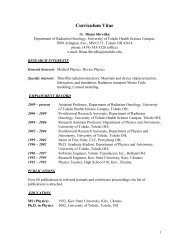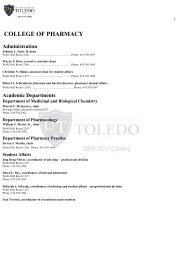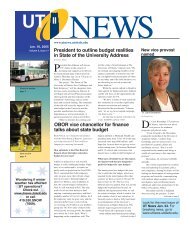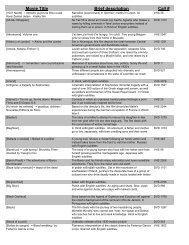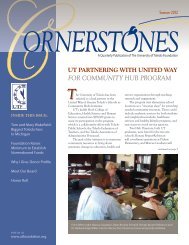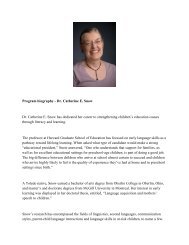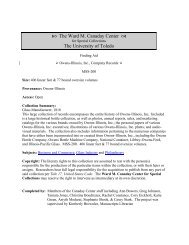GEPL Grad Student Manual - The University of Toledo
GEPL Grad Student Manual - The University of Toledo
GEPL Grad Student Manual - The University of Toledo
Create successful ePaper yourself
Turn your PDF publications into a flip-book with our unique Google optimized e-Paper software.
GEOGRAPHY AND PLANNING<br />
MA GRADUATE PROGRAM HANDBOOK<br />
2012-2013<br />
PREPARED BY THE GRADUATE FACULTY<br />
GEOGRAPHY AND PLANNING<br />
THE UNIVERSITY OF TOLEDO<br />
AUGUST 2012
<strong>GEPL</strong> <strong>Grad</strong>uate <strong>Student</strong> Handbook AY2012-13<br />
INTRODUCTION TO NEW GRADUATE STUDENTS<br />
<strong>The</strong> faculty, staff and continuing graduate and undergraduate students <strong>of</strong> the Department <strong>of</strong><br />
Geography and Planning welcome you to our graduate program and wish you success in<br />
completion <strong>of</strong> a master's degree at the <strong>University</strong> <strong>of</strong> <strong>Toledo</strong>. This <strong>GEPL</strong> <strong>Grad</strong>uate Handbook<br />
2012-13 has been prepared to introduce you to the program, faculty, facilities and various <strong>of</strong>fices<br />
<strong>of</strong> the <strong>University</strong> and department as well as to the members <strong>of</strong> <strong>University</strong> and College support<br />
staff who can provide <strong>of</strong>ficial and/or informal assistance. We urge you to read our Handbook<br />
carefully and keep it constantly in mind as your continuing reference during your graduate<br />
studies. Please feel free to <strong>of</strong>fer comments on the contents <strong>of</strong> our Handbook. Each member <strong>of</strong><br />
our faculty and staff welcomes you to meet with us during your first semester. If at any time<br />
during the program problems related to your graduate studies arise, please feel free to contact<br />
appropriate faculty members for advice and counseling.<br />
Again, we hope your stay with us will be challenging, productive and happy.<br />
DEPARTMENT MISSION STATEMENT<br />
Since graduate students represent the department and are <strong>of</strong>ten employees <strong>of</strong> the university, it is<br />
useful that they understand the general program objectives <strong>of</strong> the department as stated in its<br />
strategic plan. <strong>The</strong> following from our UT <strong>GEPL</strong> Homepage at<br />
http://www.utoledo.edu/llss/geography defines the general objectives and mission statement<br />
<strong>of</strong> the department:<br />
<strong>The</strong> mission <strong>of</strong> the Department <strong>of</strong> Geography and Planning is to provide a quality<br />
multi-functional program that supplies service at the general education and<br />
baccalaureate level to the university community, provides quality undergraduate<br />
and graduate programs, fosters theoretical and applied research in geography<br />
and planning, promotes multicultural understanding, complements<br />
interdisciplinary work, and engages in community outreach programs.<br />
<strong>GEPL</strong> Master <strong>of</strong> Arts Program<br />
Homepage overview at:<br />
http://www.utoledo.edu/llss/geography/degrees/ma/index.html<br />
2
EXPECTATIONS FOR OUR GRADUATE STUDENTS<br />
Five primary levels <strong>of</strong> achievement are expected <strong>of</strong> graduate students:<br />
1. A general knowledge <strong>of</strong> the traditions, history and philosophical underpinnings <strong>of</strong> the<br />
disciplines <strong>of</strong> geography and planning. In addition, students are expected to achieve a<br />
level <strong>of</strong> competency in an applied or theoretical area. During the first semester all<br />
incoming graduate students will be required to take a diagnostic examination assessing<br />
their knowledge <strong>of</strong> basic geographic concepts. After the exam, each student will meet<br />
with the instructor <strong>of</strong> the philosophy and methods class to bolster skills, if needed. This<br />
may involve independent study or course work taken for credit or audit.<br />
2. Strong micro and internet computer skills in cartography, computer graphics, location<br />
analysis, and multivariate statistical analysis.<br />
3. <strong>The</strong> development <strong>of</strong> basic research skills as demonstrated by completion <strong>of</strong> a<br />
theoretical or applied thesis project.<br />
4. Comprehensive understanding <strong>of</strong> classical and contemporary literature in an area <strong>of</strong><br />
specialization, as demonstrated by successful completion <strong>of</strong> the comprehensive<br />
examination.<br />
5. Adequate writing and communications skills demonstrated by completion <strong>of</strong> a masters<br />
thesis and oral defense.<br />
TIME TO COMPLETION<br />
<strong>Student</strong>s are expected to complete the program in a timely manner with normal time to<br />
completion two years or less. <strong>Student</strong>s are expected within the first year to concentrate on class<br />
activity and complete the comprehensive examination. In the second year efforts are<br />
concentrated on the thesis. <strong>Student</strong>s requiring more than two years may be reviewed formally to<br />
determine why they are not making timely progress and whether they should be permitted to<br />
continue. After a period <strong>of</strong> six years, students will be required to retake their comprehensive<br />
examinations, and may face the loss <strong>of</strong> course credit as per the rules <strong>of</strong> the College <strong>of</strong> <strong>Grad</strong>uate<br />
Studies<br />
SOURCES OF PROGRAM INFORMATION<br />
This <strong>GEPL</strong> <strong>Grad</strong>uate <strong>Student</strong> Handbook is a composite <strong>of</strong> information obtained from a variety <strong>of</strong><br />
<strong>of</strong>ficial references as well as faculty decisions made during evaluation <strong>of</strong> the program. You<br />
should become familiar with the School <strong>of</strong> <strong>Grad</strong>uate Studies Catalog and the School <strong>of</strong> <strong>Grad</strong>uate<br />
Studies Handbook. If you have been awarded an assistantship or an internship, you must read the<br />
regulations contained in the <strong>Grad</strong>uate Assistant Handbook. Both are available online from the<br />
<strong>Grad</strong>uate School website. Departmental degree requirements must comply with <strong>of</strong>ficial<br />
3
<strong>Grad</strong>uate College requirements but some variation is possible and these are discussed in detail<br />
later.<br />
ADMISSION INFORMATION<br />
Initial contact with the Department <strong>of</strong> Geography and Planning by a prospective graduate student<br />
normally occurs through a letter <strong>of</strong> inquiry, e-mail message or postcard response requesting<br />
information and an application form. If interested in the program, the application form, fee,<br />
transcripts and letters <strong>of</strong> recommendation will be forwarded to the <strong>Grad</strong>uate School by the<br />
student. When all materials have been compiled, these are sent to the department's graduate<br />
adviser for evaluation and, eventually, the credentials are examined by the <strong>GEPL</strong> faculty.<br />
<strong>The</strong> specific requirements for admission are:<br />
1. A baccalaureate or pr<strong>of</strong>essional degree earned from a department <strong>of</strong> approved<br />
standing and granted by an accredited college or university.<br />
2. A 2.70 accumulated point hour ratio for all previous academic work or indicated<br />
performance under Sections 5 or 6 below. (Point hour ratio is computed on a 4-point<br />
system: A-4, B-3, C-2, D-1).<br />
3. All applicants with less than a 2.70 cumulative hour ratio on all undergraduate work<br />
are required to forward results <strong>of</strong> the <strong>Grad</strong>uate Record Examination (GRE) Aptitude<br />
and/or other appropriate qualifying examinations as specified by the department<br />
concerned. On the basis <strong>of</strong> the results <strong>of</strong> these examinations, the department will make a<br />
recommendation to the <strong>Grad</strong>uate School.<br />
4. Prerequisite academic work which gives evidence that the applicant should be able to<br />
pursue effectively the graduate work in the department in which specialization is desired.<br />
5. Acceptance by the college and/or department concerned.<br />
6. It is within the discretion <strong>of</strong> the various departments to require the <strong>Grad</strong>uate Record<br />
Examination or other qualifying examinations for all applicants. <strong>The</strong> Department <strong>of</strong><br />
Geography and Planning requires the verbal and quantitative sections for U.S. students<br />
with less than a 2.70 cumulative GPA for all undergraduate work. A minimum score <strong>of</strong><br />
500 in each section is preferred.<br />
7. International students are invited to apply for admission to the <strong>Grad</strong>uate School. In<br />
addition to the requirements for regular admission, all students from non-English<br />
speaking countries must achieve satisfactory scores (550+) on the Test <strong>of</strong> English as a<br />
Foreign Language (TOEFL). All international students are also required to take the GRE<br />
and score a minimum <strong>of</strong> 500 in each <strong>of</strong> the verbal and quantitative sections. All<br />
international students must also demonstrate that they have adequate financial resources<br />
for their graduate education before they can be admitted. All foreign students are<br />
required to have health and accident insurance at time <strong>of</strong> registration.<br />
4
<strong>The</strong> <strong>Grad</strong>uate School will deny admission to the students who do not meet the preceding<br />
admission requirements. <strong>Student</strong>s not meeting requirements for admission to the <strong>Grad</strong>uate<br />
School may apply to the appropriate baccalaureate college for admission as an undergraduate<br />
with degree (UWD) to make up deficiencies and to establish a basis for reconsideration <strong>of</strong><br />
admission to the <strong>Grad</strong>uate School. UWD's are not permitted to register for graduate credit<br />
courses.<br />
<strong>The</strong> Geography and Planning faculty occasionally advise a student to enroll as a UWD to<br />
increase pr<strong>of</strong>iciency in geography prior to admission as a graduate student. With the UWD<br />
status a student cannot be given financial aid and must pay cost <strong>of</strong> tuition at the undergraduate<br />
level. After one or two semesters, progress is evaluated for transfer to graduate status.<br />
Foreign students are required to pass the Test <strong>of</strong> English as a Foreign Language (TOEFL) with a<br />
minimum score <strong>of</strong> 550 and also take the <strong>Grad</strong>uate Record Examination.<br />
CLASSIFICATION OF STUDENTS<br />
<strong>The</strong> following five categories <strong>of</strong> students may be permitted to take graduate courses in the<br />
Department. In order to qualify for financial assistance, only regular admission applicants will<br />
be considered.<br />
1. Regular. An applicant is admitted as a regular graduate student if, after considering all <strong>of</strong> the<br />
required documents, the Associate Dean <strong>of</strong> <strong>Grad</strong>uate Studies is satisfied the applicant is fully<br />
qualified to undertake a degree program.<br />
2. Provisional. An applicant is admitted as a provisional student if, at the time <strong>of</strong> application, all<br />
<strong>of</strong> the requirements for admission have not been completed. All admission requirements must be<br />
completed during the first semester <strong>of</strong> attendance. Financial assistance such as <strong>Grad</strong>uate<br />
Assistantships or Internships is not available to provisional students.<br />
3. Non-Degree <strong>Student</strong>. Individuals who want specific courses or groups <strong>of</strong> courses to meet<br />
special personal needs may be considered for admission to the individual colleges as "nondegree"<br />
students. <strong>The</strong>se students are expected to have at least a bachelor's degree and must have<br />
permission <strong>of</strong> the graduate adviser <strong>of</strong> the department to enroll in each specific course. Persons<br />
applying are not candidates for degrees, but subsequent admission to a degree program is<br />
possible on recommendation <strong>of</strong> the college. In such cases, up to 12 graduate credit hours earned<br />
as a non-degree student may, upon approval, be accepted as determined by the college and<br />
department concerned.<br />
5
4. <strong>Grad</strong>uate Special <strong>Student</strong> Status. Applicants interested in taking graduate courses for personal<br />
enrichment, pr<strong>of</strong>essional development, certification, or who wish to explore graduate study<br />
before deciding on a degree program may request the simpler application form for <strong>Grad</strong>uate<br />
Special <strong>Student</strong> Status. This status is not an admission to a <strong>Grad</strong>uate School degree program.<br />
However, upon application to the <strong>Grad</strong>uate School and if subsequently accepted to a degree<br />
program, a maximum <strong>of</strong> 9 semester hours earned while on this status may, upon approval, be<br />
counted toward the degree. Applicants must present pro<strong>of</strong> <strong>of</strong> a baccalaureate degree at the time<br />
<strong>of</strong> application or within the first semester <strong>of</strong> enrollment; without such pro<strong>of</strong>, registration will be<br />
cancelled.<br />
5. Conditional Admission Status. Applicants who meet all qualifications for admission to a<br />
graduate program, except for the TOEFL requirement, will be considered for conditional<br />
admission. To be considered in this category, the applicant must (1) have submitted a TOEFL<br />
score greater than 450, (2) be self-supporting, and (3) satisfy all other academic requirements. A<br />
student with conditional admission status may not register for any graduate level course work<br />
until a TOEFL score <strong>of</strong> 550 is obtained. <strong>Student</strong>s in this category will be required to enroll for<br />
English language training at the American Language Institute until the required 550 TOEFL<br />
score is achieved.<br />
TRANSFER OF GRADUATE CREDITS<br />
<strong>Grad</strong>uate work completed in residence at other academically accredited institutions may be<br />
<strong>of</strong>fered in partial fulfillment <strong>of</strong> requirements, other than residence, for graduate degrees at <strong>The</strong><br />
<strong>University</strong> <strong>of</strong> <strong>Toledo</strong> when the work is <strong>of</strong> acceptable quality and appropriate to the student's<br />
program. Application for transfer <strong>of</strong> credit must be made to the student's adviser. <strong>The</strong><br />
department will communicate its recommendation to the Associate Dean for <strong>Grad</strong>uate Studies.<br />
<strong>The</strong> student may obtain advance approval from the adviser to take work elsewhere while enrolled<br />
at the <strong>University</strong>. <strong>The</strong> student must apply for transfer <strong>of</strong> credit as soon as the credits have been<br />
earned. As a rule, a total <strong>of</strong> 10 semester hours may be accepted for transfer for master's<br />
candidates. A student who elects to take a second master's degree at <strong>The</strong> <strong>University</strong> <strong>of</strong> <strong>Toledo</strong><br />
may use up to 12 semester hours from the first master's if the course is appropriate to the<br />
student's program.<br />
MASTER’S THESIS<br />
<strong>The</strong> Department <strong>of</strong> Geography and Planning specifies the completion <strong>of</strong> a thesis as a requirement<br />
<strong>of</strong> the Master <strong>of</strong> Art degree in Geography. <strong>The</strong> title <strong>of</strong> the thesis must be reported to the<br />
Department, and filed with the <strong>Grad</strong>uate School no later than one semester prior to the expected<br />
date <strong>of</strong> graduation. <strong>The</strong> student’s thesis adviser must approve the title <strong>of</strong> the thesis. <strong>The</strong> thesis<br />
must be uploaded to OhioLink and a signed Approval <strong>of</strong> <strong>The</strong>sis form must be turned into the<br />
<strong>Grad</strong>uate College <strong>of</strong>fice by the applicable deadline at the end <strong>of</strong> term.<br />
6
MINIMUM CONTINUOUS ENROLLMENT<br />
<strong>Grad</strong>uate students who have completed their course work and are working on class projects,<br />
thesis, and/or who are using <strong>University</strong> facilities and services, (i.e., the library, health services,<br />
computer services, laboratories, consulting with faculty, applying for graduation, etc.) must<br />
register for a minimum <strong>of</strong> one graduate credit hour each semester. Access to certain other<br />
facilities and services, such as the student recreation center and parking, will require additional<br />
user fees.<br />
It is emphasized that the above policy also is required <strong>of</strong> students who expect to consult regularly<br />
with their pr<strong>of</strong>essors about their thesis projects.<br />
Full time status is considered nine (9) hours enrolled in a term and is the minimum required for<br />
students to receive funding. Any students receiving federal student loans or similar financial<br />
assistance may be required to enroll for twelve (12) hours. Such students should consult with<br />
the Financial Aid Office on campus to determine their eligibility and enrollment requirements.<br />
GRADE POINT AVERAGE<br />
Regulations <strong>of</strong> the <strong>Grad</strong>uate Faculty require that graduate students maintain (a) a grade point<br />
average <strong>of</strong> 3.0 on a 4-point system for all courses completed and (b) an average <strong>of</strong> 3.0 on a 4point<br />
system for courses completed in the department <strong>of</strong> specialization. <strong>Student</strong>s whose grade<br />
point average falls below 3.0 on the 4-point scale are subject to dismissal from the <strong>Grad</strong>uate<br />
School. Only grades <strong>of</strong> A, A-, B+, B, B-, C+, C, C-, D+, D, D- and F are used in determining<br />
grade point averages.<br />
<strong>Student</strong>s are also required to have a B or better in the department's three core courses (<strong>GEPL</strong><br />
6100; <strong>GEPL</strong> 6150; <strong>GEPL</strong> 6920). <strong>Student</strong>s who do not attain a B or better in either Research<br />
Methods (6150) or Philosophy and General Methodology (6100) or both, would have to retake<br />
either course and would be ineligible to take the comprehensive exam.<br />
For individual study, master's thesis and other projects at the graduate level, the letters PR may<br />
be used for work in progress. <strong>The</strong> "PR" letter grade will not be considered in the grade point<br />
average. Geography and Planning faculty use the "PR" grade only for thesis credit hours (<strong>GEPL</strong><br />
6960). Other work not completed on time will be graded "I" (incomplete) and is calculated in<br />
the grade point average as an "F". A grade <strong>of</strong> "I" must be completed before the end <strong>of</strong> the<br />
following semester. In addition, grades <strong>of</strong> "S" and "U" are used for special graduate courses in<br />
Geography and Planning, particularly Teaching Practicum (<strong>GEPL</strong> 6700) and Internship (<strong>GEPL</strong><br />
6940) courses, which do not apply toward the degree requirements.<br />
7
REQUIREMENTS FOR THE MASTER OF ARTS DEGREE<br />
IN GEOGRAPHY AND PLANNING<br />
<strong>The</strong> School <strong>of</strong> <strong>Grad</strong>uate Studies Catalog contains the degree requirements for a Master <strong>of</strong> Arts in<br />
Geography and Planning. Each new graduate student is expected to become familiar with these<br />
requirements. To assist new students and to maintain a progress report, a check sheet has been<br />
prepared that contains a more detailed inventory <strong>of</strong> information. During advanced registration<br />
every semester, each student will be expected to meet with the <strong>Grad</strong>uate Advisor to examine<br />
individual progress in the program and to prepare course schedules for the following semester.<br />
<strong>The</strong> "<strong>GEPL</strong> MA Program Checklist" is a progress report that guides the student through the twoyear<br />
graduate program and should become the major reference document for both the student and<br />
adviser. <strong>Grad</strong>uate student progress is also tracked and recorded in the <strong>GEPL</strong> department <strong>of</strong>fice<br />
on a large wall chart, a smaller version <strong>of</strong> which you may want keep with your checklist. Work<br />
with the <strong>Grad</strong>uate Advisor to make sure the checklist and chart are occasionally updated as you<br />
proceed through the several stages toward completion <strong>of</strong> the program..<br />
Important items related to a graduate student's record <strong>of</strong> progress are discussed below and<br />
include:<br />
1. Entering Status. Although most students are admitted on a "regular" status, an occasional<br />
student will be admitted as "provisional" for reasons described above. <strong>The</strong> <strong>Grad</strong>uate School and<br />
the departmental graduate adviser forward reasons for provisional admission to the student. In<br />
most cases, provisional status will be changed to regular after one or two semesters <strong>of</strong> study.<br />
Faculty review <strong>of</strong> the student's progress is necessary for this change. Only students with regular<br />
admission status can receive graduate assistantships and internships.<br />
2. Prerequisites. A course or courses covering basic cartography and statistics is required<br />
(<strong>GEPL</strong> 4420 "Quantitative Methods in Geography" satisfies this requirement). New graduate<br />
students who are deficient in this requirement must complete prerequisites as described early in<br />
their programs. <strong>The</strong>y best option for ameliorating this deficiency is to enroll in <strong>GEPL</strong> 5420<br />
"Quantitative Methods in Geography" during the first fall semester <strong>of</strong> the student's program.<br />
3. Undergraduate Major. Some students are welcomed and admitted to the graduate program<br />
with majors other than geography. If the faculty believe that such students have the potential to<br />
complete the master's degree, then admission is granted, <strong>of</strong>ten provisionally or as a UWD. After<br />
successful completion <strong>of</strong> several courses in the department (courses selected with the assistance<br />
<strong>of</strong> the faculty), then regular status will be granted.<br />
4. <strong>Grad</strong>uate Record Examination. It is recommended that prospective graduate students take<br />
the GRE in preparation for graduate school. <strong>The</strong> exam is mandatory for students whose GPA is<br />
below 2.7 on a four-point scale. <strong>The</strong> Department <strong>of</strong> Geography and Planning requires the verbal<br />
and quantitative sections.<br />
8
5. Program Record. <strong>The</strong> master's degree requires 36 semester hours distributed as follows:<br />
a. Sixteen (16) <strong>of</strong> the thirty six (36) minimum hours to be taken in the department should<br />
be at the 6000 level. <strong>The</strong>se are seminars in the pr<strong>of</strong>essional specialty areas <strong>of</strong> faculty and<br />
at least two are scheduled each semester. Over a two-year period, students should be<br />
exposed to seminars involving the department’s entire graduate faculty. <strong>The</strong>re is no<br />
maximum number <strong>of</strong> semester hours for 6000 level seminars. <strong>Student</strong>s may take courses<br />
from the Spatially Integrated Social Science Ph.D. program (SISS) at the 7000 and 8000<br />
levels in order to fulfill the 6000 level seminar requirement. However, these courses may<br />
only be taken by students with advanced course work in the subject matter and with the<br />
consent <strong>of</strong> the instructor. Enrolment in SISS courses is not guaranteed for M.A.<br />
students in Geography and Planning. In addition, SISS courses cannot be counted as<br />
courses outside <strong>of</strong> the department (see requirement c below).<br />
<strong>The</strong> 16-hours must also include three required courses: Philosophy and General<br />
Methodology (6100), Research Methods (6150), and Research Design (6920). <strong>The</strong> 16hour<br />
requirement may not include the following courses: 6700, 6910, 6940, and 6960.<br />
<strong>GEPL</strong> 6910 Comprehensive Exam Preparation is an additional required course not<br />
included in the 16 hours.<br />
b. <strong>The</strong> remaining hours can be taken at the 5000 level and the department <strong>of</strong>fers a variety<br />
<strong>of</strong> courses, including an Urban and Regional Planning sequence, a Geographic<br />
Techniques and Applications track, an Urban-Economic track, an Environmental track,<br />
and a Cultural-Behavioral track. Up to four credit hours <strong>of</strong> 5920 (Directed Readings in<br />
Geography) and/or 5910 (Directed Research in Geography) may be allowed toward the<br />
36-hour requirement.<br />
c. At least one course (a maximum <strong>of</strong> three) is to be selected from outside the department.<br />
Preferably the outside courses should be seminar level but <strong>of</strong>ten such courses are not<br />
available every semester and students may need to postpone this requirement until a<br />
thesis direction is selected and specific courses become available. All outside courses<br />
must be approved by the <strong>Grad</strong>uate Adviser.<br />
d. <strong>The</strong>sis hours. Enrollment for thesis credit is reserved for the second year <strong>of</strong> the<br />
program after the comprehensive examination has been passed and the student has an<br />
approved thesis research proposal. Minimum enrollment to qualify for the master's<br />
degree is two hours <strong>of</strong> thesis credit, but as many as six can be assigned a letter grade and<br />
counted within the 36 hour minimum requirement. Additional thesis hours above six<br />
may be taken but those will been assigned a grade <strong>of</strong> S (Satisfactory). Generally, these<br />
hours are spread over the two semesters <strong>of</strong> the second year. <strong>Grad</strong>es will be reported as<br />
Progress (PR) until the thesis has been completed and defended. <strong>The</strong>n a change-<strong>of</strong>-grade<br />
report will be included with necessary documents to the <strong>Grad</strong>uate School for <strong>of</strong>ficial<br />
completion <strong>of</strong> the master's degree.<br />
A minimum GPA <strong>of</strong> 3.0 must be maintained for satisfactory progress. If the GPA drops below<br />
3.0 the <strong>Grad</strong>uate School will notify the student about this problem. Faculty will review the<br />
records <strong>of</strong> students who have academic difficulties and make recommendations. If the GPA does<br />
9
not return to the 3.0 level or higher, the student may be asked to leave the program or to resign<br />
from either the assistantship or internship until satisfactory progress is made. As noted above,<br />
the PR grade is reserved for the thesis only and this grade does not affect the GPA. However, an<br />
Incomplete grade (I) will be given in those graduate classes where academic requirements have<br />
not been met. An incomplete is counted as an "F" or Failure until the work is completed to the<br />
instructor's satisfaction. GPA's can be adversely affected by an incomplete grade until the work<br />
is finished. An Incomplete grade must be removed before the end <strong>of</strong> the following semester.<br />
6. Comprehensive Examination. <strong>The</strong> comprehensive examination will be scheduled at the end<br />
<strong>of</strong> the first year <strong>of</strong> the graduate program, during the second half <strong>of</strong> the Spring Semester. To<br />
qualify, a student must have a "B" average (3.0 or better) for all graduate course work, a B or<br />
better in Philosophy and General Methods (6100) and Research Methods (6150), at least 9 credit<br />
hours <strong>of</strong> completed course work not including teaching practicum or internship credit, be<br />
enrolled for a full-time schedule during the semester when the comprehensive exam is scheduled,<br />
and have all incomplete and progress grades removed from the record. Upon successful<br />
completion <strong>of</strong> the examination, the student is formally admitted to candidacy for the master's<br />
degree in geography and planning. Also, students must have successfully completed the<br />
requirements for the diagnostic exam.<br />
Format <strong>of</strong> the Comprehensive Examination<br />
<strong>The</strong> comprehensive examination contains two parts, a written examination followed by<br />
an oral examination. <strong>The</strong> content <strong>of</strong> the written and oral examinations are divided into<br />
two primary examination topics: (1) a general set <strong>of</strong> questions related to core material<br />
associated with the philosophical and historical elements <strong>of</strong> the discipline <strong>of</strong> geography<br />
and planning, and (2) a set <strong>of</strong> questions related to a specific specialization area within<br />
geography and planning that interests the student.<br />
Composition <strong>of</strong> the Examination Committee<br />
<strong>The</strong> graduate advisor will meet with the department faculty to select two faculty<br />
examiners for each student. <strong>Student</strong>s will not select their examination committee. <strong>The</strong><br />
composition <strong>of</strong> the faculty committee will be based primarily on the student's area <strong>of</strong><br />
specialization. <strong>The</strong> two examiners will submit two questions each, for the written portion<br />
<strong>of</strong> the examination. Two addition questions will be provided based on course work from<br />
Philosophy & Methodology and Research Methods This is a closed book examination<br />
and students are given the entire day to complete the written examination. In the one<br />
hour oral examination, the two examiners will discuss the results from the written exam<br />
and ask questions <strong>of</strong> the student. Evaluation <strong>of</strong> the student would be made by the two<br />
examiners in consultation with the graduate advisor.<br />
Criteria for Evaluating <strong>Student</strong> Performances on the Comprehensive Examination<br />
<strong>The</strong> general understanding <strong>of</strong> the faculty is that little additional preparation is needed for<br />
the exam other than selected readings and a review <strong>of</strong> past course work. Other than the<br />
general review, all candidates preparing for the examination should consult with each <strong>of</strong><br />
the two examiners to prepare a bibliography <strong>of</strong> selected reading materials in the topical<br />
10
area <strong>of</strong> their specialization. Consultation with each <strong>of</strong> the faculty members will alert the<br />
student to those general and specific areas which will be covered in the examination.<br />
Specific evaluation criteria to be used in the examination include the following:<br />
1. <strong>The</strong> student's understanding <strong>of</strong> the philosophical and historical dimensions <strong>of</strong> the<br />
discipline <strong>of</strong> geography.<br />
2. <strong>The</strong> ability <strong>of</strong> the student to define and understand basic geographic concepts,<br />
methods and theories in their field <strong>of</strong> specialization.<br />
3. <strong>The</strong> level <strong>of</strong> the student's comprehension <strong>of</strong> the current literature and authors in their<br />
areas <strong>of</strong> specialization.<br />
4. <strong>The</strong> student's writing skills with respect to coherence, organization and accuracy.<br />
5. <strong>The</strong> student's oral communication skills.<br />
<strong>Grad</strong>ing <strong>of</strong> the Comprehensive Examination<br />
<strong>Student</strong>s may pass the comprehensive examination unconditionally and continue normal<br />
progress toward the degree. <strong>Student</strong>s who pass unconditionally are given a letter grade.<br />
A conditional pass means that examiners have learned <strong>of</strong> some deficiencies in the<br />
student's knowledge <strong>of</strong> the discipline and additional study is assigned. <strong>The</strong> student will<br />
be notified <strong>of</strong> these deficiencies after the oral exam and later in writing. <strong>The</strong> conditional<br />
pass is not a reprimand but a constructive criticism. Candidacy will be delayed until<br />
successful completion <strong>of</strong> remedial study, to be determined by exam committee and the<br />
graduate adviser. This work will need to be completed and evaluated prior to the start <strong>of</strong><br />
the next fall term in order for the study to continue in the program. Upon successful<br />
completion <strong>of</strong> remedial requirements, a student will be assigned a grade no higher than a<br />
B+. Occasionally a student may not meet the expectations <strong>of</strong> the examiners and will be<br />
asked to repeat the oral exam or the entire examination, normally during the following<br />
semester. A second unsuccessful attempt will result in the student being required to leave<br />
the graduate program.<br />
7. <strong>The</strong>sis. Immediately after the successful completion <strong>of</strong> the comprehensive exams, a student<br />
can begin to establish a <strong>The</strong>sis Advisory Committee (by completing a Department <strong>The</strong>sis<br />
Advising Form). Some students may want to use the summer semester following their successful<br />
completion <strong>of</strong> the comprehensive exams to develop their thesis proposal and defend the proposal,<br />
perhaps even to complete work on the thesis. <strong>The</strong> required <strong>GEPL</strong> 6920 Research Design <strong>of</strong>fered<br />
each Fall Semester will help serve these functions. It is emphasized that the faculty composition<br />
<strong>of</strong> the thesis committee does not have to be the same as the comprehensive examination<br />
committee. A thesis committee consisting <strong>of</strong> three voting members is required for each student.<br />
<strong>The</strong> student should be assigned a thesis advisor, at this time, whose area <strong>of</strong> specialization is<br />
consistent with the student's thesis topic. One member <strong>of</strong> the committee may be a faculty<br />
member from outside the department. In the case <strong>of</strong> the applied thesis option, the committee will<br />
consist <strong>of</strong> three geography and planning faculty members and a fourth member (practicing<br />
pr<strong>of</strong>essional) from an outside agency. After the committee has been formed and the proposal has<br />
11
een accepted by the faculty, the graduate school's Notice <strong>of</strong> <strong>The</strong>sis form must be filed with the<br />
<strong>Grad</strong>uate School.<br />
Following the selection <strong>of</strong> the thesis committee and the research topic the student will prepare a<br />
formal thesis proposal to be presented orally to the department's faculty and students. <strong>The</strong><br />
mandatory course Research Design (<strong>GEPL</strong> 6920), <strong>of</strong>fered every Fall Semester, must be<br />
completed by all graduate students in good standing after the successful completion <strong>of</strong> their<br />
comprehensive exams.<br />
<strong>The</strong> second year <strong>of</strong> the graduate program usually consists <strong>of</strong> thesis research while completing<br />
required course work. A final degree requirement consists <strong>of</strong> a formal defense <strong>of</strong> the thesis<br />
research to faculty, graduate students, guests and the public-at-large. <strong>The</strong> department does not<br />
permit a defense to be conducted by student and entire committee via conference call, email,<br />
internet, video or any other electronic format. <strong>The</strong> defense must be conducted with the student<br />
and at least two other committee members present and in an open public forum. <strong>The</strong> defense <strong>of</strong><br />
a thesis is to be approved by the thesis advisor in consultation with the thesis committee. Once<br />
the thesis defense has been scheduled by the thesis advisor a notice will be provided to the<br />
<strong>Grad</strong>uate Advisor who will post and distribute public announcements <strong>of</strong> the defense.<br />
<strong>The</strong> presentation and successful defense and submission <strong>of</strong> an approved thesis generally<br />
completes the formal program. At this time all incomplete and progress grades must be removed<br />
from the record and a Plan <strong>of</strong> Study must be on file with the <strong>Grad</strong>uate School unless this<br />
requirement had been met earlier. Faculty committee members will complete the necessary<br />
papers for the <strong>Grad</strong>uate School. <strong>The</strong> student must submit two copies <strong>of</strong> the thesis to the<br />
<strong>Grad</strong>uate School and one copy to the departmental library. Often graduate students give a final<br />
copy <strong>of</strong> the thesis to each member serving on their thesis committee, as a courtesy.<br />
<strong>The</strong>sis Options<br />
Two thesis track options are available to students based on their interests and career<br />
objectives: (1) the traditional academic thesis, and (2) the pr<strong>of</strong>essional or applied thesis<br />
option.<br />
<strong>The</strong> pr<strong>of</strong>essional project option differs from the traditional academic thesis only by its<br />
emphasis on the practical solution to problems through the application <strong>of</strong> geographic<br />
methodology and techniques. Formats <strong>of</strong> the two-thesis option are similar and will vary<br />
according to the nature <strong>of</strong> the problem or topic. <strong>The</strong> following provide generalized<br />
formats for the two options:<br />
<strong>The</strong> Traditional Academic <strong>The</strong>sis Option<br />
� Statement <strong>of</strong> Problem<br />
� Literature Review<br />
� Research Hypotheses<br />
� Rationale <strong>of</strong> Study<br />
� Operational Definitions<br />
12
� Research Methodology and Study Format<br />
� Analyses and Results<br />
� <strong>The</strong>oretical, Applied or Policy Implications<br />
� Areas <strong>of</strong> Future Research<br />
<strong>The</strong> Applied <strong>The</strong>sis Option<br />
� Executive Summary<br />
� Statement <strong>of</strong> Problem<br />
� Objectives <strong>of</strong> Study<br />
� Rationale <strong>of</strong> Study<br />
� Methodology Employed in Solving the Problem: Results, Analysis and<br />
Discussion<br />
� Conclusions<br />
� Planning Recommendations<br />
Additional components <strong>of</strong> the applied thesis would necessarily include maps and figures<br />
where appropriate and a bibliography. Where necessary, a technical appendix must also<br />
accompany the text when models or techniques <strong>of</strong> a complex nature are incorporated in<br />
the study.<br />
Human Subjects Research Review Requirements<br />
All research projects (papers and theses) that require the use <strong>of</strong> human subjects as data<br />
sources (i.e. surveys, experiments, etc.) must be approved by the graduate school's Office<br />
<strong>of</strong> Research. A Human Subjects Research Review Committee form that investigators<br />
must be filed in this case. It is emphasized that if this form is not on file at the time a<br />
thesis employing human subjects is submitted to the graduate school, graduation may be<br />
jeopardized. Regardless <strong>of</strong> the thesis option selected, students will be required to prepare<br />
a written proposal and present their thesis topics orally to the faculty and students <strong>of</strong> the<br />
department.<br />
8. Assistantships, Internships and Awards. Teaching Assistantships, Research<br />
Assistantships and Internship awards are available on a competitive basis for qualified students.<br />
Assistantships are awarded on a yearly basis; students who are awarded an assistantship in their<br />
first year should not necessarily assume that assistantships will be available in their second year.<br />
Factors that enter into the awarding <strong>of</strong> assistantships include the availability <strong>of</strong> funds within the<br />
department and each student’s record <strong>of</strong> performance. <strong>Student</strong>s who are awarded Teaching<br />
Assistantships should become familiar with the <strong>Grad</strong>uate Assistant Handbook, prepared by the<br />
<strong>Grad</strong>uate School, which accompanies this departmental handbook.<br />
Teaching Assistantships<br />
A teaching assistantship provides a stipend and allows tuition fees to be waived.<br />
<strong>The</strong>refore, this award is presented only to highly qualified students. A teaching assistant<br />
functions as a member <strong>of</strong> the instructional staff <strong>of</strong> the department. In this position,<br />
students are expected to conduct themselves in a pr<strong>of</strong>essional manner in representing the<br />
13
university and department. Teaching assistants are assigned to specific faculty members’<br />
courses and are generally expected to teach recitation sections, help in grading <strong>of</strong><br />
evaluation, to have scheduled <strong>of</strong>fice hours and meet with regularly with students.<br />
Teaching Assistants will be required to provide an average <strong>of</strong> 20 hours per week on<br />
assigned duties during each term. Teaching Assistants are required to attend orientation<br />
and training sessions organized by the Center for Teaching Excellence.<br />
Research Assistantships<br />
Selected research assistantships are also available, from time to time, depending on<br />
external research funds. <strong>Student</strong>s awarded a research assistantship are normally provided<br />
a stipend and fee waivers. Under this form <strong>of</strong> support the student is assigned to work on<br />
specific research projects <strong>of</strong> individual faculty members. <strong>The</strong> specific functions<br />
performed by the student are determined by the nature <strong>of</strong> the project. Research<br />
Assistants will be required to provide an average <strong>of</strong> 20 hours per week on assigned duties<br />
during each term.<br />
Internships<br />
Internships are awarded on a competitive basis to outstanding students. Most internships<br />
provide a stipend and carry fee waivers similar to those <strong>of</strong> a teaching assistantship.<br />
Criteria for eligibility for a graduate internship include:<br />
1. Second year students and/or first year students with a minimum 3.0<br />
GPA.<br />
2. Second year students who have excelled in their first year <strong>of</strong> graduate<br />
school and have demonstrated competence in planning and applied geography,<br />
in communication and interpersonal skills. In some cases, first year students<br />
with an exceptional undergraduate record may be considered for internships.<br />
3. <strong>Student</strong>s with competence in quantitative and qualitative research and<br />
technical skills.<br />
4. Demonstrated commitment to the disciplines <strong>of</strong> geography and<br />
planning.<br />
5. A successful interview with a cooperating agency.<br />
Objectives <strong>of</strong> the Internship Program: <strong>The</strong> internship program provides<br />
students with paid employment opportunities in the local community that serve a<br />
number <strong>of</strong> purposes including but not limited to:<br />
� Broadening the student intern's educational experience,<br />
� Allowing the application <strong>of</strong> the classroom experience in a near-laboratory<br />
environment,<br />
14
� Facilitating the fusion <strong>of</strong> theoretical and applied geography in an actual,<br />
problem-solving situation,<br />
� Providing a stipend roughly equal to that <strong>of</strong> a graduate teaching assistant and<br />
course credit,<br />
� Stimulating a more broad based graduate experience by increasing the number<br />
<strong>of</strong> graduate students in the program, solving local community problems, and<br />
� Establishing relationships between the <strong>University</strong> and the community.<br />
Internship Functions: <strong>Student</strong> interns may serve in a public or privately funded<br />
internship and can work for up to 20 hours per week. Among the employers that<br />
have participated in the department's intern program are the Bedford Township<br />
Board <strong>of</strong> Trustees, the City <strong>of</strong> <strong>Toledo</strong>, the Greater <strong>Toledo</strong> Council <strong>of</strong> <strong>The</strong> Arts,<br />
Neighborhood Housing Services, Inc., the Small Business Assistance<br />
Corporation, the <strong>Toledo</strong> Edison Company, and the <strong>Toledo</strong> Metropolitan Area<br />
Council <strong>of</strong> Governments.<br />
<strong>Student</strong> internships usually take one <strong>of</strong> two forms. About one-half <strong>of</strong> the<br />
internships in effect at a given time involve a specific project or problem to be<br />
solved. In most cases, the student intern is responsible for the completion <strong>of</strong> the<br />
project or the formulation <strong>of</strong> a plan to address the issue in question. Problems are<br />
<strong>of</strong>ten <strong>of</strong> a planning nature and require a combination <strong>of</strong> geographic skills. <strong>The</strong><br />
remaining half <strong>of</strong> the internships involve the ongoing monitoring <strong>of</strong> a local<br />
problem or the holding <strong>of</strong> a particular position in an agency or firm. <strong>The</strong>se<br />
positions usually require a broad base in spatial problem-solving and demand that<br />
the student intern address a broad set <strong>of</strong> issues and problems that come up on a<br />
daily basis. <strong>The</strong> holding <strong>of</strong> a graduate student internship is not guaranteed.<br />
Internships are not always available and then are allotted on the basis <strong>of</strong><br />
qualifications, interest, progress toward degree, personal preference <strong>of</strong> the<br />
graduate student body, and experience.<br />
Internship Reporting Procedures: All graduate interns are expected to maintain<br />
a log-sheet outlining their daily activities, using the appropriate form. <strong>The</strong>se<br />
forms should be given to the graduate intern advisor on a biweekly basis.<br />
Monthly meetings will be arranged with graduate interns and the intern advisor to<br />
discuss and review agency activities. During each semester, a meeting will also<br />
occur between the cooperating intern supervisor, the graduate intern advisor and<br />
the student to access the student’s progress.<br />
Internship Contracts and Responsibilities: <strong>Grad</strong>uate internships represent<br />
contractual agreements between the university, the cooperating agency and the<br />
student. <strong>The</strong> appropriate contract form must be completed and filed. Under the<br />
contractual agreement, the student is an employee <strong>of</strong> the university on loan to the<br />
agency. <strong>The</strong> agency pays the student's stipend, while the university provides a<br />
match funding the fees <strong>of</strong> the student. Failure <strong>of</strong> a student to comply with the<br />
15
hourly and functional obligations <strong>of</strong> the internship may lead to legal action<br />
including cancellation <strong>of</strong> the contract.<br />
All <strong>of</strong> the preceding forms <strong>of</strong> financial assistance require specified hours <strong>of</strong> work<br />
each week by graduate students. Teaching assistantships include classroom<br />
instruction, laboratory instruction and maintenance <strong>of</strong> equipment, several forms <strong>of</strong><br />
paperwork, including writing and grading <strong>of</strong> examinations, and additional<br />
assignments as requested by faculty. Internships generally are <strong>of</strong>f campus with<br />
local planning agencies or business firms, and are supervised by pr<strong>of</strong>essionals<br />
with many years <strong>of</strong> experience. Consequently, valuable on-the-job experience<br />
enhances the pr<strong>of</strong>essional credentials <strong>of</strong> second year graduate students, <strong>of</strong>ten<br />
leading to permanent, full-time positions with local firms.<br />
SPECIAL HONORS OR AWARDS<br />
Additional stipends are available from the <strong>Grad</strong>uate School for students with outstanding<br />
undergraduate records. <strong>The</strong>se include Board <strong>of</strong> Trustees scholarships and scholarships from<br />
foundations and societies. Information about these awards are available from the <strong>Grad</strong>uate<br />
School but the faculty occasionally nominates students with exceptional credentials.<br />
16
GRADUATE STUDENT USE OF DEPARTMENT FACILITIES<br />
Department Laboratories:<br />
<strong>Grad</strong>uate students are given full access to department instructional computer laboratory. Posted<br />
hours for student use <strong>of</strong> this lab are from 9:00 AM to 9:00 PM on weekdays. However, graduate<br />
students are permitted to use this facility twenty-four hours a day. We request that when working<br />
in the lab that outside doors be locked during the hours that the lab is <strong>of</strong>ficially closed (9:00 PM<br />
to 9:00 AM). In addition, we urge graduate students to use caution in the use <strong>of</strong> this facility<br />
during evenings and weekends for their own personal safety and security. We ask all members <strong>of</strong><br />
the department to maintain security in this lab, since the university does not carry insurance on<br />
instructional equipment.<br />
Selected graduate students will also have access to the Geographic Information Science and<br />
Applied Geographics (GISAG) Laboratory. This laboratory is restricted to faculty sponsored<br />
research and contract work and only those students assigned to specific projects will be permitted<br />
access. In addition, some students involved in environmental research projects will have access<br />
to the departmental GIS and Remote Sensing laboratory at the Lake Erie center.<br />
Xeroxing:<br />
A Xerox copying machine is available in the department <strong>of</strong>fices and may be used only during<br />
business hours with permission <strong>of</strong> the secretary or faculty. Due to budgetary limitations free<br />
copying <strong>of</strong> personal materials, including class-work is prohibited. <strong>Grad</strong>uate teaching<br />
assistants may use the Xerox machine without cost only for instructional class activity related to<br />
their teaching assignments, subject to approval by the primary course instructor. General <strong>of</strong>fice<br />
supplies are available to teaching assistants only for their instructional assignments.<br />
<strong>Grad</strong>uate Office Space:<br />
Office space will be provided when available to graduate students. Priorities in the allocation <strong>of</strong><br />
<strong>of</strong>fice space to graduate students will be first to teaching assistants, followed by research<br />
assistants, graduate internships and other graduate students. Office space is at a premium and<br />
may require several persons sharing an <strong>of</strong>fice. It is the responsibility <strong>of</strong> each person in an <strong>of</strong>fice<br />
to provide a quiet, clean and supportive work environment. Telephones are provided in <strong>of</strong>fices<br />
primarily for on-campus communications. Please keep to a minimum local calls <strong>of</strong>f campus.<br />
<strong>Grad</strong>uate students must receive permission to make long distance telephone calls on department<br />
telephones.<br />
<strong>University</strong> Computer and Library Services:<br />
<strong>The</strong> use <strong>of</strong> university computer and library services is governed by the rules <strong>of</strong> these centers.<br />
<strong>Grad</strong>uate students entering the program will be given information on services and computer<br />
accounts early in their first semester <strong>of</strong> residence.<br />
17
<strong>Grad</strong>uate <strong>Student</strong> Association Services:<br />
<strong>The</strong> graduate student association provides pr<strong>of</strong>essional social support services to students. A<br />
department representative to the graduate student association is elected each year by our<br />
students. <strong>The</strong> association provides many important services to students including financial grants<br />
for career development (travel grants) and small grants for thesis and dissertation research.<br />
<strong>Student</strong>s are encouraged to compete for these awards in order to support travel to pr<strong>of</strong>essional<br />
meeting and expenditures associated with their thesis research.<br />
FEE PAYMENTS<br />
<strong>Student</strong>s receiving assistantships and internships awards are given stipends and in/out <strong>of</strong> state fee<br />
waivers during the Fall and Spring semester. Summer semester fee waivers are only available for<br />
students having awards during the summer semester. In all cases, students are responsible for<br />
the graduate application and matriculation fees, a semester general fee and parking fees.<br />
<strong>Grad</strong>uate teaching assistants are eligible for a reduction in their parking fees. Health insurance is<br />
also available through the graduate school. Teaching assistants are given a reduced rate for<br />
health insurance and may elect the payroll deduction option for their share <strong>of</strong> the charges. All<br />
other students must pay the full payment at the beginning <strong>of</strong> each semester. A family health<br />
insurance plan, paid by the student, is also available through the university.<br />
CLASS REGISTRATION PROCEDURES<br />
<strong>Student</strong>s are expected to meet with the graduate advisor each semester to select the following<br />
semester's courses. <strong>The</strong> graduate advisor must approve the student’s course selections. <strong>Student</strong>s<br />
who have completed their comprehensive examination may also wish to review course selections<br />
with their thesis advisor. Final approval remains within the authority <strong>of</strong> the graduate advisor.<br />
After their first semester in residence, students are encouraged to take advantage <strong>of</strong> the early<br />
registration period to avoid the inconveniences associated with the late open registration.<br />
SEXUAL HARASSMENT<br />
<strong>The</strong> <strong>University</strong> <strong>of</strong> <strong>Toledo</strong> has very strict regulations regarding sexual harassment and<br />
discrimination. We ask all graduate students to be aware <strong>of</strong> these policies and follow the<br />
regulations. Teaching assistants should be especially careful in dealing with students to avoid<br />
any potential incidents that may jeopardize their pr<strong>of</strong>essional careers. Any incidents <strong>of</strong> sexual<br />
harassment should be immediately reported to the department chair.<br />
DEPARTMENT COLLOQUIA<br />
Throughout the year the department hosts various visiting scholars. In most cases, these<br />
individuals will present lectures and seminars to our graduate students. <strong>The</strong> presentations provide<br />
a unique opportunity to augment our existing faculty ranks and to give students a chance to meet<br />
and speak with many outstanding scholars. All faculty and graduate students are expected to<br />
attend these functions. <strong>Student</strong>s are reminded that one <strong>of</strong> the important criteria in selection for<br />
assistantships and internships is a commitment to pr<strong>of</strong>essional development; attendance at<br />
departmental colloquia is evidence <strong>of</strong> this commitment.<br />
18
MEMBERSHIP IN PROFESSIONAL ORGANIZATIONS<br />
<strong>Student</strong>s are encouraged to join pr<strong>of</strong>essional organizations affiliated with the department. <strong>The</strong>se<br />
include <strong>The</strong> Association <strong>of</strong> American Geographers and the American Planning Association.<br />
<strong>The</strong>se organizations <strong>of</strong>fer student membership rates and special student programs at pr<strong>of</strong>essional<br />
meetings.<br />
ATTENDANCE AT PROFESSIONAL MEETINGS<br />
<strong>Student</strong>s are encouraged to attend pr<strong>of</strong>essional meetings and to present papers. <strong>The</strong> faculty is<br />
pleased to work with students in helping them prepare presentations. When possible, financial<br />
support to attend meetings and present papers will be provided to students.<br />
ACADEMIC GRIEVANCE PROCEDURE<br />
In the event that a graduate student has an academic grievance, he or she should attempt to<br />
resolve the problem by adhering to the following procedure:<br />
1. Discuss the problem with the instructor involved<br />
2. If no resolution can be achieved, the student should present his or her grievance to the<br />
chairperson <strong>of</strong> the department<br />
3. If the problem is still not resolved, the student should see the dean <strong>of</strong> the college<br />
4. If a resolution has been unsuccessful at the college dean's level, the student may present the<br />
grievance to the <strong>Grad</strong>uate School.<br />
5. <strong>The</strong> final appeal can be made to the Committee on Academic Standing <strong>of</strong> the <strong>Grad</strong>uate<br />
Council and its decision shall be binding on all parties involved in the grievance.<br />
Note: <strong>Grad</strong>uate students must file the initial grievance with the instructor and a copy to the<br />
department no later than one semester after the occurrence <strong>of</strong> the incident.<br />
19
DEPARTMENT ORGANIZATION CHART<br />
Knowledge <strong>of</strong> the administrative organization <strong>of</strong> the department is <strong>of</strong>ten helpful in knowing<br />
whom to contact if problems develop. <strong>The</strong> following briefly defines the primary organizational<br />
context <strong>of</strong> the department:<br />
Department Secretary<br />
Tammy Golkiewicz<br />
President <strong>of</strong> the <strong>University</strong><br />
Dr. Lloyd Jacobs<br />
Provost and Vice President for Academic Affairs<br />
Dr. William McMillen<br />
Dean <strong>of</strong> the College <strong>of</strong> Language, Literature and Social Science<br />
Dr Alice Skeens Vice Provost for <strong>Grad</strong>uate<br />
Affairs and Dean<br />
College <strong>of</strong> <strong>Grad</strong>uate Studies<br />
Dr. Patricia Komuniecki<br />
Chair, Department <strong>of</strong> Geography and Planning<br />
Dr. Patrick Lawrence<br />
Personnel Committee <strong>Grad</strong>uate Advisor Undergraduate Advisor Intern Director<br />
Chair Dr. Daniel Hammel Dr. David J. Nemeth Dr. Daniel<br />
Dr. Kevin Czajkowski Hammel<br />
AAUP Liaison<br />
Carlson Library Liason Undergraduate GTU Advisor<br />
Dr. David Nemeth Recruiter Dr. David J. Nemeth<br />
Dr David J. Nemeth<br />
Undergraduate Writing <strong>Grad</strong>uate<br />
Curriculum Across <strong>The</strong> Curriculum<br />
Committee Curriculum Committee<br />
Chair: Nemeth Committee Chair: Hammel<br />
Chair:Nemeth<br />
Director Director Director Director<br />
Instructional Lake Erie Center Labs GISAG Center H<strong>of</strong>fman Library<br />
Computing Lab<br />
Dr. Peter Lindquist Dr. Kevin Czajkowski Dr. Peter Lindquist Dr. David J. Nemeth<br />
20
DEPARTMENT FACULTY<br />
http://www.utoledo.edu/llss/geography/facultystaff/deptfaculty/index.html<br />
Bhuiyan M. Alam (2006). Associate Pr<strong>of</strong>essor, B.S. Bangladesh <strong>University</strong>; M.S. Asian<br />
Institute <strong>of</strong> Technology; M.S. Florida State <strong>University</strong>; PhD., Florida State <strong>University</strong>.<br />
Specialties: GIS, Transportation Planning, Environmental Planning, Urban & Regional Planning,<br />
Regional Development.<br />
Frank J. Calzonetti (2001). Pr<strong>of</strong>essor and Vice Provost for Research and Economic<br />
Development, B.A., M.A, Wayne State <strong>University</strong>, Ph.D., <strong>University</strong> <strong>of</strong> Oklahoma. Economic<br />
Geography, Regional Development.<br />
Kevin P. Czajkowski (1998). Pr<strong>of</strong>essor, B.S. State <strong>University</strong> <strong>of</strong> New York at Oneonta, Ph. D.,<br />
<strong>University</strong> <strong>of</strong> Michigan. Specialties: Remote Sensing, Weather and Climate, Physical<br />
Hydrology and Atmospheric-Land Surface Processes.<br />
Daniel J. Hammel (2005). Pr<strong>of</strong>essor & MA Program Director, B.A. Kansas State <strong>University</strong>,<br />
M.A., Ph.D., <strong>University</strong> <strong>of</strong> Minnesota. Specialties: Urban/Economic Geography, Housing,<br />
Urban Planning.<br />
Patrick L. Lawrence (2000). Pr<strong>of</strong>essor & Chair, B.E.S. <strong>University</strong> <strong>of</strong> Waterloo; M.Sc.<br />
<strong>University</strong> <strong>of</strong> Guelph; Ph.D. <strong>University</strong> <strong>of</strong> Waterloo. Specialties: Ecosystem/Environmental<br />
Management, Water Resources/Watershed Management, Land Use Policy and Planning.<br />
Peter S. Lindquist (1988). Associate Pr<strong>of</strong>essor, SISS Program Director & GISAG Director, B.S.<br />
<strong>University</strong> <strong>of</strong> Wisconsin-Eau Claire, M.S.L.A. <strong>University</strong> <strong>of</strong> Wisconsin-Madison, Ph.D.<br />
<strong>University</strong> <strong>of</strong> Wisconsin-Milwaukee. Specialties: Geographic Information Science, Digital<br />
Cartography, Location Analysis, Transportation.<br />
Neusa Hidalgo Monroy McWilliams (2010). Visiting Assistant Pr<strong>of</strong>essor, B.A. National School<br />
<strong>of</strong> Anthropology and History (Mexico), M.A. and Ph.D. <strong>University</strong> <strong>of</strong> California, Berkeley.<br />
Specialties: Cultural and Human Geography, Latin America, Rural Development, Border issues<br />
and Immigration, Indigenous Cultures.<br />
David Jim Nemeth (1989). Pr<strong>of</strong>essor & Undergraduate Program Director, B.A. and M.A.<br />
California State <strong>University</strong>-Northridge; Ph.D., <strong>University</strong> <strong>of</strong> California-Los Angeles. Specialties:<br />
Philosophy and Methodology, Cultural Geography, Geography <strong>of</strong> Asia, Conservation and<br />
Resources.<br />
Neil Reid (1991), Pr<strong>of</strong>essor, Director Urban Affairs Center, B.A. <strong>The</strong> <strong>University</strong> <strong>of</strong> Glasgow;<br />
M.A. Miami <strong>University</strong>; Ph.D. Arizona State <strong>University</strong>. Specialties: Industrial Geography,<br />
Economic Geography, Urban Geography.<br />
Mary Beth Schlemper (2010), Assistant Pr<strong>of</strong>essor & GTU Advisor. B.A., M.A., <strong>University</strong> <strong>of</strong><br />
Missouri, Ph.D., <strong>University</strong> <strong>of</strong> Wisconsin-Madison. Specialties: Cultural and Historical<br />
Geography, Geographic Education.<br />
21
Sujata Shetty (2005), Associatet Pr<strong>of</strong>essor, B.Arch., School <strong>of</strong> Planning and Architecture, New<br />
Delhi, India, M.U.P., Ph.D., <strong>University</strong> <strong>of</strong> Michigan. Specialties: Urban and Regional Planning,<br />
Community Economic Development.<br />
Tammy Golkiewicz – Office Support Staff<br />
Shari Grayczyk – Grants Account Clerk<br />
Salman Hashmi – GISAG Lab Manager<br />
Sarah Schafer – Senior Project Manager<br />
DEPARTMENT STAFF<br />
22
College <strong>of</strong> <strong>Grad</strong>uate Studies website: http://www.utoledo.edu/graduate/<br />
Be sure to download the <strong>Grad</strong>uate College's Handbook for Preparation <strong>of</strong> <strong>Grad</strong>uate <strong>The</strong>ses early<br />
on during your first year in the program, and to study it closely.<br />
Important Forms available: at this site:<br />
http://www.utoledo.edu/graduate/currentstudents/academicprogramforms/index.html<br />
and this site<br />
http://www.utoledo.edu/graduate/currentstudents/academicprogramforms/theseanddissert<br />
ationinfoandrscs.html<br />
You will see here a list <strong>of</strong> <strong>Grad</strong>uate College forms that <strong>GEPL</strong> MA students after acceptance into<br />
our Program are required to complete at appropriate times before graduating. <strong>The</strong> purpose <strong>of</strong><br />
these forms is described in the online downloadable College <strong>of</strong> <strong>Grad</strong>uate Studies Handbook.<br />
<strong>The</strong>se forms include:<br />
Plan <strong>of</strong> Study<br />
Plan <strong>of</strong> Study Course Substitution<br />
<strong>Grad</strong>uate Research Advisory Committee Approval & Assurances (GRAD)<br />
Application for <strong>Grad</strong>uation<br />
Assurances <strong>of</strong> Compliance<br />
Intellectual Protection and Patent Sign-Off Form<br />
Approval <strong>of</strong> <strong>The</strong>sis<br />
Human Subjects Research Summary Description<br />
Request for Employment Outside <strong>of</strong> Assistantship Duties<br />
23
DEGREE REQUIREMENTS SUMMARY<br />
MA in Geography (36 credit hours <strong>of</strong> graduate work)<br />
� That 16 <strong>of</strong> the 36 minimum hours to be taken in the department are at the 6000 level.<br />
� Fifteen additional elective hours may be taken at the 5000 or 6000 level within the<br />
major.<br />
� Mandatory courses: <strong>GEPL</strong> 6100 Philosophy & General Methodology, <strong>GEPL</strong> 6150<br />
Seminar in Research Methods, <strong>GEPL</strong> 6910 Comprehensive Exam Preparation,<br />
<strong>GEPL</strong> 6920 Research Design<br />
� Minimum <strong>of</strong> one graduate level course taken in related area outside the department<br />
� B grade or better in <strong>GEPL</strong> 6100 and <strong>GEPL</strong> 6150<br />
� Successful Completion <strong>of</strong> <strong>GEPL</strong> 6910<br />
� Successful Completion <strong>of</strong> <strong>GEPL</strong> 6920 (for MA candidates in second year standing)<br />
� Minimum <strong>of</strong> 2 hours <strong>of</strong> thesis credits, but as many as 6 hours within 36 credit hours<br />
(for more details on program requirements students are referred to the UT General<br />
Catalog www.utoledo.edu)<br />
<strong>GEPL</strong> <strong>Grad</strong>uate Course Listing<br />
<strong>GEPL</strong> 5040 Geographic Education Strategies<br />
<strong>GEPL</strong> 5060 Geography <strong>of</strong> the Great Lakes*<br />
<strong>GEPL</strong> 5110 Geographic Information Systems<br />
<strong>GEPL</strong> 5160 Patterns <strong>of</strong> World Development<br />
<strong>GEPL</strong> 5180 Geographic Information Systems Applications<br />
<strong>GEPL</strong> 5210 Land Use Planning<br />
<strong>GEPL</strong> 5490 Remote Sensing <strong>of</strong> the Environment<br />
<strong>GEPL</strong> 5500 Digital Image Analysis<br />
<strong>GEPL</strong> 5520 Analytical and Computer Cartography*<br />
<strong>GEPL</strong> 5530 Principles <strong>of</strong> Urban Planning<br />
<strong>GEPL</strong> 5540 Weather and Climate<br />
<strong>GEPL</strong> 5550 Community Economic Development Planning*<br />
<strong>GEPL</strong> 5570 Land Development and Planning<br />
<strong>GEPL</strong> 5580 Location Analysis*<br />
<strong>GEPL</strong> 5600 Urban Design<br />
<strong>GEPL</strong> 5650 Physical Geography<br />
<strong>GEPL</strong> 5700 Community Planning Workshop<br />
<strong>GEPL</strong> 5710 Urban Environments<br />
<strong>GEPL</strong> 5750 Transportation Geography<br />
<strong>GEPL</strong> 5810 Political Geography*<br />
<strong>GEPL</strong> 5890 Field Experience*<br />
<strong>GEPL</strong> 5910 Directed Research in Geography<br />
<strong>GEPL</strong> 5920 Directed Readings in Geography<br />
<strong>GEPL</strong> 6000 Seminar in Planning <strong>The</strong>ory<br />
<strong>GEPL</strong> 6100 Philosophy & General Methodology<br />
24
<strong>GEPL</strong> 6150 Seminar in Research Methods<br />
<strong>GEPL</strong> 6160 Seminar in Spatial Analysis*<br />
<strong>GEPL</strong> 6190 Advanced Geographic Information Systems Seminar*<br />
<strong>GEPL</strong> 6200 Earth System Science through Inquiry Based Learning*<br />
<strong>GEPL</strong> 6250 Advanced Remote Sensing Seminar*<br />
<strong>GEPL</strong> 6300 Seminar in Resource Management*<br />
<strong>GEPL</strong> 6400 Seminar Environmental Perception*<br />
<strong>GEPL</strong> 6530 Seminar- Urban/Regional Planning Applications*<br />
<strong>GEPL</strong> 6550 Seminar in Environmental Planning*<br />
<strong>GEPL</strong> 6570 Seminar in Neighborhood Revitalization*<br />
<strong>GEPL</strong> 6580 Urban Development and Housing*<br />
<strong>GEPL</strong> 6660 Topics in Regional Geography<br />
<strong>GEPL</strong> 6700 Teaching Practicum in Geography<br />
<strong>GEPL</strong> 6910 Comprehensive Exam Preparation<br />
<strong>GEPL</strong> 6920 Research Design<br />
<strong>GEPL</strong> 6930 General Seminar<br />
<strong>GEPL</strong> 6940 Internship in Planning<br />
<strong>GEPL</strong> 6950 Applied Geographic Workshop<br />
<strong>GEPL</strong> 6960 <strong>The</strong>sis<br />
*<strong>The</strong>se courses are <strong>of</strong>fered on an occasional basis. Contact the graduate advisor for more<br />
information regarding their scheduling.<br />
25
2012/2013 <strong>GEPL</strong> <strong>Grad</strong>uate Program Requirements Checklist<br />
For:____________________________________<br />
16 = <strong>GEPL</strong> credit hours 6000 level (not 6700, 6910, 6940, 6960)<br />
Includes mandatory:<br />
<strong>GEPL</strong> 6100 Philosophy & Methods (3) __<br />
<strong>GEPL</strong> 6150 Research Methods (4) __<br />
<strong>GEPL</strong> 6920 Research Design (3) __<br />
Other <strong>GEPL</strong> 6000 courses (6) __<br />
<strong>GEPL</strong> 6910 Comprehensive Exam Preparation __<br />
15 = <strong>GEPL</strong> Electives (5000 or 6000, does not include <strong>GEPL</strong> 6910) __<br />
3 = <strong>Grad</strong>uate level course (5000 or 6000) outside <strong>GEPL</strong> __<br />
<strong>The</strong>sis Hours (minimum 2, maximum 6 graded)<br />
__<br />
36 = TOTAL HOURS (minimum, not including 6910) __<br />
Advisor: _________________________________________ Date: _____________<br />
27


